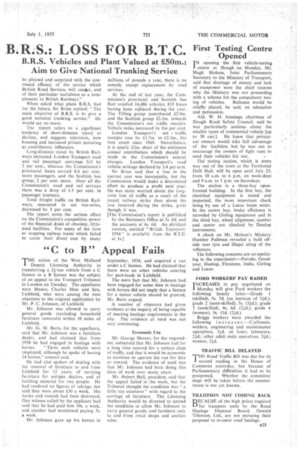B.R.S.: LOSS FOR B.T.C.
Page 49

If you've noticed an error in this article please click here to report it so we can fix it.
B.R.S. Vehicles and Plant Valued at £50m.: Aim to Give National Trunking Service
be pleased and surprised with the continued efficacy of the service which British Road Services will render, and of their particular usefulness as a complement to British Railways."
When asked what plans B.R.S. had for the future, Sir Brian replied: "The main objective of B.R.S. is to give a good national trunking service." He would say no more.
The report refers to a significant tendency of short-distance travel to
• decline, and suggests television, new housing and increased private motoring as contributory influences.
Long-distance travel by British Railways increased. London Transport road and rail passenger carryings fell by 3 per cent., whereas the Commission's provincial buses carried 0.4 per cent. more passengers, and the Scottish bus group, 2 per cent. more. Over all the Commission's road and rail services there was a drop of 1.3 per cent. in passenger journeys.
Total freight traffic on British Railways, measured in net ton-miles, decreased by 3 per cent.
The report notes the serious effect on the Commission's competitive power of the financial drain of obsolete, littleused facilities. For many of the slow or stopping railway trains which failed to cover their direct cost by many millions of pounds a year, there is no remedy except replacement by road services.
At the end of last year, the Commission's provincial and Scottish bus fleet totalled 14,486 vehicles, 833 buses having been replaced during the year. The Tilling group contributed £2.9m. and the Scottish group £2.1m. towards the Commission's net traffic receipts. Vehicle miles increased by 0.6 per cent.
London Transport's net • traffic receipts rose by £1.7m. to £2.3m., the best result since 1949. Nevertheless, it is nearly Om. short of the minimum annual contribution which should be made to the Commission's central charges. London Transport's road vehicle mileage declined by 3.4 per cent.
Sir Brian said that a loss in the current year was inescapable, but the Commission would make a determined effort to produce a profit next year. He was more worried about the longterm loss of traffic as a result of the recent railway strike than about the loss incurred during the strike, great though it was.
[The Commission's report is published by the Stationery Office at 3s. 6d. and the accounts at 6s. 6d. An abridged version, entitled "British Transport: 1954" is available from the B.T.0 at Is.]












































































































































